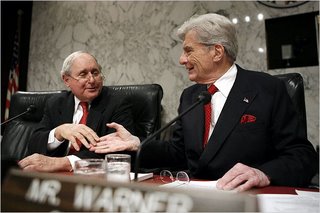Party Consolidation?
An OP-ED piece in today's New York Times argues the most recent election has shown the Republican and Democratic parties have come back and consolidated power after years of attacks from independents.
I agree... sort of.
Democrats do seem to have found their way, clearly enough to regain the majority, though Republicans, as always, have stayed on message (albeit, a losing message).
But I just don't buy the argument that "Today, the parties accommodate only views that run from the middle to the opposite ends of each Spectrum." The author himself cites Jim Webb, the Virginia Senator-elect, who is "outside the party's traditional orthodoxy."
And then there is Bob Casey, Senator-elect of Pennsylvania, who defeated Republican Rick Santorum, #3 in the Senate. Casey is at odds with his fellow Democrats on many social issues; he is pro-life and pro-gun.
What this tells me is the Democrats, in particular, have significantly widened their tent to gain the majority. I don't see any indications of party unity here. They are adapting to win... in some races.
Take, for example the Lieberman-Lamont race in Connecticut. Democrats stabbed their own incumbent, a well respected former Presidential candidate, in the back... for all the good it did them. Lieberman still won a convincing victory by sticking to his message and honestly expressing his views. This race was a huge loss for Democrats, whose candidate was virulent anti-war.
This race proved a weakness in the Democrats' strategy when trying to pander to the party base, as opposed to races such as Virginia and Pennsylvania. It also proved that the country is far more conservative and security minded than many Democrats think. The Republicans weren't voted out of office so much to get us out of Iraq, as they were to clean up a war that has been run incompetently.
Lieberman's victory highlights the continuing threat independents and third parties can pose. Looking to New York, Mayor Mike Bloomberg, a Republican, stood by Lieberman when Lieberman's own former party members ditched him.
Democrats' shift to the right in many cases indicates the potential for a serious third party challenge. If Democrats turn left again in 2008, and if Republicans continue a drift to the Right, along with greater Religious Right pandering, candidates like Lieberman, Bloomberg and - Dare I say it - Schwarzenegger, may be positioned to step in and capitalize on the best of what both parties have to offer.









No comments:
Post a Comment